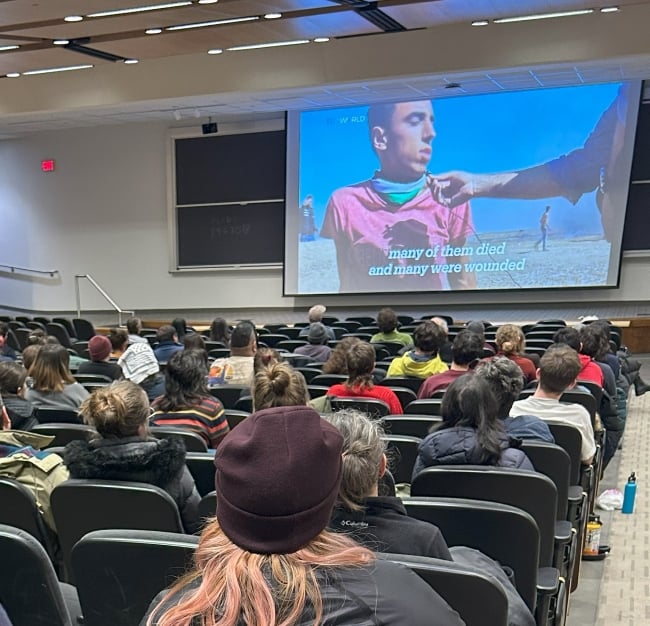You have /5 articles left.
Sign up for a free account or log in.

Students at the University of Pennsylvania watched the documentary Israelism during an on-campus screening on Nov. 28, 2023, after administrators asked them to postpone the event.
Erin Axelman
A documentary about two young Jewish Americans who question their loyalty to Israel after traveling to the country and the West Bank has become a flash point in the academic freedom debates consuming some college campuses amid the Israel-Hamas war.
The award-winning film, Israelism, debuted at a film festival earlier this year and more than 60 screenings of it were planned—many on college campuses—across the country this fall and winter. Most of the screenings so far have happened without incident, but at Hunter College in New York and the University of Pennsylvania, the documentary has been the source of controversy over the past month.
Students at Penn are now facing possible disciplinary action after screening the film last week despite university administrators reportedly telling them to postpone the event.
Penn Steps Into the Fray
“The message this sends is that if you have questions or strong feelings, don’t voice them too loudly,” said Jack Starobin, a political science major and board member of Penn Chavurah, the progressive Jewish student group that originally organized the screening. “The university’s response to us hosting this film attests to just how vulnerable higher education institutions are when free speech or student safety become the objects of national political games.”
While scores of colleges and universities have been caught in the crossfire of politicians’ criticisms of how they should handle war-related tensions on campus, Penn is perhaps one of the most high-profile examples.
Even before the war began in October, Liz Magill, Penn’s president, faced criticism from the Anti-Defamation League for hosting the Palestine Writes Literature Festival on campus in September, which featured speakers “known for espousing anti-Semitic rhetoric,” according to a federal complaint filed by the Louis D. Brandeis Center for Human Rights Under Law. Magill has both condemned antisemitism—announcing new plans last month to combat it on campus—and defended “open expression and academic freedom” as “central to our educational mission.”
Multiple major donors have withdrawn their support for the university, and Magill has also faced calls to resign, including from former New Jersey governor Chris Christie, who is running for president.
On Tuesday, House Republicans grilled Magill, alongside the presidents of Harvard University and MIT, during a hearing on their universities’ approaches to addressing antisemitism on campus.
“Under my leadership, we will never, ever shrink from our moral responsibility to combat antisemitism and educate all to recognize and reject hate,” Magill said, while also defending academic freedom.
It was against that backdrop that a screening of Israelism was scheduled—with university approval—for Oct. 24, about three weeks after Hamas attacked Israel on Oct. 7. Although the plans had been in place since the summer, Starobin, the Jewish student who helped organize the event, said Penn Chavurah decided to postpone it until November.
“A lot of people were feeling really traumatized after the Oct. 7 attack. We wanted this event to be an accessible, healthy space for respectful dialogue. We wanted to extend the invitation to the event to people who may disagree with us and may be more attached to Israel as part of their identities,” he said. “We wanted to extend that invitation in good faith and thought that right after Oct. 7 was not the time to do that.”
In late October, the student group attempted to rebook an event space to screen the film Nov. 28, and “that’s where things started to get complicated,” said Starobin, who added that the university was “unusually unresponsive” until Nov. 21, one week before Israelism was supposed to play on campus. That’s when Penn Chavurah was told by administrators that the university would not approve the event.
“They said the film was not right for the climate on campus at this time because people were being vitriolic and would not respond well,” Starobin said.
From there, Penn Chavurah reached out to the university’s Middle East Center and explained their dilemma. The center submitted another request to book a room for the same time and date (Nov. 28) for a film screening but didn’t specify that it would show Israelism. The university approved that request.
“It was only after the university became aware we were planning to screen this particular film in that space that the university contacted us, Penn Chavurah, and said that if we went forward with the screening anyway, we could lose our funding or status as a recognized organization and student organizers could face disciplinary action,” Starobin said. “We thought this was a crucial conversation to have right now, given how fraught it can be to be a Jewish student on campus right now.”
But coordinated opposition to Israelism has come from individuals online this fall, according to Forward, a Jewish nonprofit news organization. “Israelism is not educational. It is not inclusive. It is not portraying an interesting viewpoint,” one of those emails sent to college administrators said. “The movie openly gives justification to those shouting ‘Kill the Jews,’ ‘Globalize the Intifada,’ etc.”
Oberlin College, Yale University and Penn have reportedly received a barrage of similar emails urging them to cancel planned screenings of the documentary. Hunter, part of the City University of New York, also confirmed that it received several of those emails.
However, the precise motivations for Penn’s decision to cancel the screening remain unclear.
An email from the Office of Student Affairs sent to Starobin one day before the planned screening said the university wanted the event postponed and “committed to February as the month to host the screening.” But Starobin said by that point, it was “too little, too late.” He and other students held a protest the evening before the screening and then went ahead with the event as planned.
Harun Küçük, an associate professor of history and sociology of science and faculty director of the Middle East Center, resigned his position as director of the center the day of the screening, according to The Philadelphia Inquirer.
“We are alarmed to learn that in response to this inappropriate pressure from administrators, the director of the Middle East Center submitted his resignation today,” read a statement Penn’s chapter of the American Association of University Professors posted in the hours before the screening, urging people to attend. “His resignation underlines the gravity of the crisis, and the responsibility the President and Provost have for creating and exacerbating it.
“We condemn in the strongest possible terms any pressure by administrators, donors, and trustees to prevent the Middle East Center from reserving a room to screen a documentary film that falls squarely within the Center’s area of expertise.”
According to Starobin, Hikaru Kozuma, Penn’s vice provost for university life, called him about 30 minutes before the event, threatening disciplinary action if the students held the screening that night.
“When I asked him on what basis we would face disciplinary action, he did not have an answer,” said Starobin, who added that administrators had also threatened Penn Chavurah’s funding and status as a university organization in previous conversations. “When I pressed him on it, he alluded to the health and safety of the Penn community.”
The university did not respond to questions about the controversy surrounding the Israelism screening and specifically which policy the student organizers allegedly violated.
Starobin said they have been referred to the Center for Community Standards and Accountability, which is in the process of determining whether they have violated any university policies, and they expect to hear back this week.
“I don’t think any disciplinary action against the students is warranted, and it’s just a further extension of the university’s efforts to suppress students’ academic freedom and freedom of speech,” said David Kazanjian, an English professor and communications secretary for Penn’s AAUP chapter. Kazanjian, who has taught at Penn since 2006, said these perceived efforts to suppress academic freedom on campus are “not completely unprecedented, but well beyond” anything he’s ever seen on campus.
The Middle East Studies Association of North America has also condemned the university’s attempts to halt the screening of the documentary.
“This action manifests a disregard for your students’ constitutionally protected right of free speech and a violation of the principles of academic freedom,” said a Dec. 1 letter from MESANA to Penn’s president and administrators, which also called on the university to not pursue disciplinary action against the student organizers and to ask Küçük to resume his position at the Middle East Center. “This country’s institutions of higher education should be places in which a broad range of perspectives can be expressed, debated and criticized. Your administration’s actions in this matter are thus an abdication of professional, academic and civic responsibility.”
Multiple people who attended the screening of Israelism at Penn last week said it took place without incident and was typical of any other movie screening on campus.
“We’ve never had a single incident at any screening of ours, and we’ve done well over 50 at this point,” said Erin Axelman, co-director and co-producer of Israelism, who did a question-and-answer session after the screening at Penn last week. “Our film is about change. We welcome anyone who initially had misperceptions about our film but upon watching our film and engaging with the material is willing to change their mind.”
Screening Off, Then On at Hunter
Axelman also hosted a question-and-answer session after a screening of Israelism at Hunter College Tuesday evening, but that was only after students and faculty protested the university’s cancellation of the event, which was originally scheduled for Nov. 14.
“We seek constructive dialogue that avoids targeting any students, faculty or staff based on their identity: the essence of bigotry,” Ann Kirschner, Hunter’s interim president, said in a statement posted online the day the film was originally scheduled for screening. “In the current climate, we seek to balance our commitment to free speech and academic freedom with the danger of antisemitic and divisive rhetoric.”
Immediate backlash ensued. “This is an egregious and illegitimate violation of the academic freedom necessary for departments to pursue their academic missions and institutions of higher education to operate with integrity,” read a Nov. 15 resolution from the Hunter College Senate, which represents faculty, students and staff. Two days later, PEN America, a free expression advocacy group, characterized Hunter’s cancellation of the screening as “antithetical to the principles of free expression.”
By the end of the month, the college had rescheduled the screening for the evening of Dec. 5., which “was always the plan,” Vince DiMiceli, college spokesperson, told The New York Times. As part of the new plan, the college invited Andy Bachman, a local rabbi, to moderate the discussion after the film while Axelman and Simone Zimmerman, one of the film’s protagonists, answered questions from the audience.
Partial Win for Academic Freedom
Sarah Chinn, chair of the Hunter Senate, took issue with the presence of the rabbi and questioned the need for him as moderator.
“I don’t understand why a rabbi would give any more context than any other religious leader to a geopolitical conflict,” she said before the screening Tuesday night. “If you want context, you should get a historian of the Middle East.”
While Hunter’s film and media department had originally planned to co-sponsor the event alongside Arabic Studies (which is part of the Department of Classical and Oriental Studies), the college reportedly eliminated Arabic Studies’ role and the film and media department also withdrew as a result, according to Chinn.
Chinn, who attended the screening at Hunter Tuesday night, said Bachman kept asking Axelman and Zimmerman “extremely challenging questions” and “was quite aggressive toward them and their expertise.”
Chinn said that after Bachman did not ask many of the questions audience members had written on index cards, she asked why he wasn’t asking them.
“Then it got a little chaotic because people were so angry at being ignored,” Chinn recalled. “It became a back-and-forth with students from the audience challenging him and the claims he was making. That got a little heated, but they were pretty respectful considering how upset they were.”
Axelman also said in a text message Wednesday that Bachman “didn’t ask us a single question about anything that happened in the film” and “primarily criticized us for what we didn’t discuss.” Axelman agreed to allow Bachman to moderate, which they said was a condition the college set for the event to happen.
As a result, Chinn said, Tuesday night’s screening of Israelism was only a partial win for academic freedom.
“It is a kind of academic freedom, but only because I spoke up and made the space for it,” she said. “There was no space for that academic freedom to the extent that none of the questions students wrote were actually being asked.”








